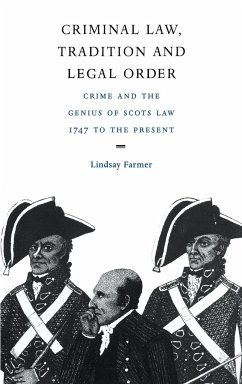This book is a critical and historical study of the theory of criminal law which examines, in particular, the relationship between legal tradition and national identity, while developing a radically new approach to questions of responsibility and subjectivity. Previous studies have focused either on the philosophical bases of the criminal law or on the sociology and social history of crime, but there has been little exchange between the two. Lindsay Farmer's is one of the first extended attempts to draw on both fields in order to analyse the body of theorising about the criminal law as a whole. It displays a rare knowledge of the legal, institutional and historical contexts in which criminal law is practised, in combination with an informed understanding of the law itself. Dr Farmer uses contemporary social theory to develop an account of the relationship between legal practice and national culture in Scotland, analysing the belief in the distinctive spirit or 'genius' of Scots law. An exploration of the boundary between national limits and the universal aspirations of criminal law theory reveals the specifically modern characteristics of the criminal law and exposes how contemporary criminal law theory fundamentally misrepresents the character of modern criminal justice.








